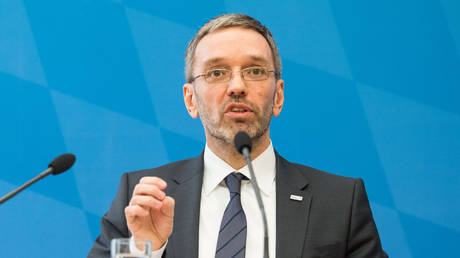ARTICLE AD BOX
Psychological stress was also a deciding factor in the decrease in Austrian recruitment last year, according to Klaudia Tanner
Young Austrians are getting too fat to join the military, Defense Secretary Klaudia Tanner warned during a press conference on Thursday, attributing last year’s decrease in the number of military conscripts to growing obesity among the youth.
The year 2023 saw 45,565 conscripts – 217 fewer than 2022. Of these, just 31,516 were classified as fit, a decline of 528 from the previous year, while 3,421 were deemed temporarily unfit (359 more than in 2022) and 9,989 were deemed unfit (an increase of 71 over 2022).
In addition to the decline in physical fitness, Tanner pointed to psychological stress as a factor impeding military readiness.
Read more Austrian government violated neutrality to platform Zelensky – opposition leader
Austrian government violated neutrality to platform Zelensky – opposition leader
“The young generation must become healthier and fitter again,” she insisted.
However, Tanner highlighted the introduction of voluntary military service for women as a “great success,” noting that 212 women had applied since the service opened to them in April, and 126 of those had already successfully enlisted.
While a willingness to serve in a civilian capacity in Austria remains high – Youth State Secretary Claudia Plakolm reported a nearly 90% coverage rate during Thursday’s press conference – a recent survey commissioned by the Ministry of Defense indicated that the population’s willingness to protect the nation with weapons was declining.
Only 31% of those surveyed said they were willing to take up arms to defend Austria in the event of a military attack, and 58% said they would not defend their country even “if the worst came to the worst.”
At the same time, a slight majority (53%) of respondents said troop numbers should be increased, and the same percentage said the duration of basic military service was too short. Those agreeing with the latter statement were more likely to be older, suggesting a willingness to support the military but stopping short of actually serving in it.
Indeed, 69% of respondents said they had a positive attitude toward the Austrian Armed Forces, and 66% said the military was “very important” or “important” – an increase of three points over 2022’s numbers. While 81% approved of the military’s domestic operations, such as disaster relief, just 53% viewed its foreign missions positively.
Austria’s defense budget exceeds €4 billion (almost $4.4 billion) for the first time this year, marking a third straight year of record-breaking military spending. The figure is expected to exceed €5 billion by 2027 and hit 1.5% of GDP by 2028. Tanner has pledged to use the windfall to “invest even more in military equipment,” specifically hundreds of helicopters and military trucks, and increase the number of civilians employed by the military.
.png)
 1 year ago
4
1 year ago
4








 English (US)
English (US)